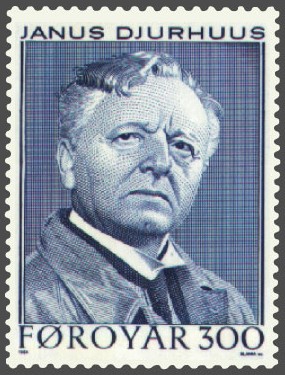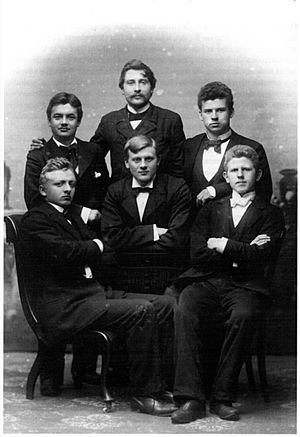Janus Djurhuus facts for kids
Jens Hendrik Oliver Djurhuus, known as Janus Djurhuus, was born in Tórshavn, Faroe Islands, on February 26, 1881. He passed away in Tórshavn on September 1, 1948. He is famous for being the very first modern poet from the Faroe Islands. Janus and his younger brother, Hans Andrias Djurhuus, who was also a poet, are often called the Áarstova brothers. This is because they grew up in a house named Áarstova.
Contents
Life and Education
Janus Djurhuus's parents were Óla Jákup Djurhuus and Else Marie Poulsen. His family had a history in the Faroe Islands, as he was a great-grandson of Jens Christian Djurhuus.
Janus once shared that his journey into poetry truly began at school. He was inspired when he heard Jákup Dahl recite a powerful poem called Nú er tann stundin komin til handa. This poem was an anthem for the Christmas Meeting of 1888, an important event that started the rise of Faroese nationalism. This moment deeply influenced Janus and sparked his poetic spirit.
Becoming a Lawyer
Janus Djurhuus decided to study law. After finishing his first exams in 1897, he moved to Denmark to prepare for university. He studied in Copenhagen and then on the island of Bornholm. He passed his main exams in 1900 and earned his law degree in 1911.
For many years, Janus worked as a lawyer in Copenhagen. However, he always stayed connected to his home, the Faroe Islands, especially through students who came to Denmark from there. In the late 1930s, he returned to the Faroes to practice law there.
His Poetic Journey
Janus Djurhuus's first poem, "Blíð er summarnátt á Føroya landi," was published in 1901. In 1914, he released Yrkingar (Poems). This was a very special moment because it was the first time a collection of poems by a single poet was published in the Faroese language. He went on to publish four more collections of his poems.
Janus also studied classical philology, which is the study of ancient Greek and Latin languages and literature. He was very skilled at translating old works into Faroese. He translated parts of Plato's Dialogues and poems by Sappho. After he passed away, his poetic translation of Homer's Iliad was also published. He also translated works by famous poets like Goethe, Dante, Heinrich Heine, and Gustaf Fröding.
There's a fun story about his love for ancient Greek. Once, when a Greek ship docked in Tórshavn, Janus went aboard. He asked a cabin boy to fetch the captain. When the captain arrived, Janus began to recite the Odyssey in ancient Greek! The captain was so surprised and delighted that he joined in the recitation.
Poetry Style and Influences
Janus Djurhuus's poetry often mixed ideas from classical and Norse mythology. He used both modern Faroese language and words from traditional Faroese ballads, called Kvæði. His poems also took inspiration from ancient and modern poetry in other Scandinavian languages. The rhythm of his poems was even influenced by ancient Greek and modern German poetry.
Literary Importance
Janus Djurhuus's poetry was a huge step forward for modern literature in the Faroese language. Many people believe his work is "among the best" of modern Scandinavian writing. It has been described as "splendid" and full of "great vision and musicality." Some even consider him the greatest Faroese poet, calling him "the first Faroese writer of genius" and "without a doubt a great poet."
He was a "national romantic," meaning he deeply loved his homeland. However, his poems sometimes showed a conflict between his beautiful dreams of the Faroe Islands and the everyday reality. For example, his poem "Útlegd" (Exile) talks about his many years living in Denmark and shows a sense of sadness or doubt about being away from home.
Selected Works
Poetry Collections
- Yrkingar. Copenhagen: Hitt Føroyska Studentafelagið, 1914. (Revised edition in 1923.)
- Nyggjar Yrkingar. Copenhagen: Hitt Føroyska Studentafelagið, 1938.
- Carmina. Tórshavn: H.N. Jacobsen, 1941.
- Moriendo. Tórshavn: Norrøna forlagið, 1944.
- Yrkingar 1898-1948. Edited by Christian Matras. Copenhagen: Mentunargrunnur Studentafelagsins, 1988. (This is a collection of all his poems.)
Translated Works
- Plato. Symposion—Gorgias. Copenhagen: Føroyingafelag, 1938.
- Homer. Ilionskvæði. Tórshavn, 1967. (This is his translation of the Iliad.)
Honours and Recognition
On September 20, 2004, the Faroese post office honored Janus Djurhuus. They released a special set of ten stamps, designed by Anker Eli Petersen, which featured ten of his famous poems. This stamp series was chosen as the most popular stamp issue of the year by the public.
Images for kids
-
"Atlantis"
-
"Loki"
-
"Móses á Sinai fjalli" (Moses on Mount Sinai")
-
"Cello"
 | Calvin Brent |
 | Walter T. Bailey |
 | Martha Cassell Thompson |
 | Alberta Jeannette Cassell |













